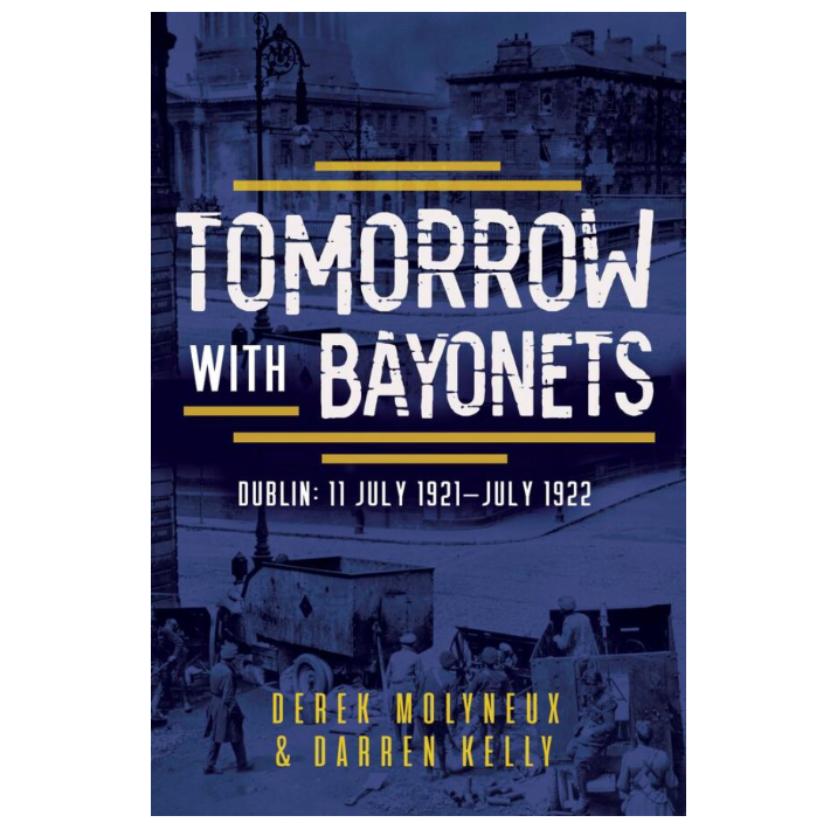TOMORROW WITH BAYONETS by MOLYNEUX, DEREK, KELLY, DARREN
TOMORROW WITH BAYONETS by MOLYNEUX, DEREK, KELLY, DARREN
Couldn't load pickup availability
The raw intensity of the Irish Civil War is brought to life in this gripping, fast-paced journey from July 1921 to July 1922 – a year of change and conflict. Dublin’s descent into violent unrest surpasses the turbulence of the Easter Rising. Treaty debates spark dissension, and as tensions mount, Dublin becomes a tinderbox of espionage, betrayal, and guerrilla warfare. Former allies who fought shoulder to shoulder in the IRA now find themselves divided and entrenched in an ideological struggle that threatens to tear Dublin and Ireland apart. More than a historical recount, ‘Tomorrow With Bayonets’ offers a visceral portrayal of a nation grappling with its identity and sovereignty, seen through the eyes of combatants, leaders, and civilians caught in the crossfire.
The Provisional Government’s National Army and the IRA engage in sporadic but fierce clashes as unrelenting violence and chaos engulf the country. In Northern Ireland, there is growing disillusionment among IRA units due to the diminishing credibility of assurances from Michael Collins. Ongoing assaults on their communities, the nationalist population experiences a rising number of casualties due to rampant brutality from unionist militias. A suppression of inquiries into killings leads to a widespread feeling of abandonment by the Provisional Government.
On June 4 1922, the Provisional Government implemented ‘a policy of peaceful obstruction’ towards the Belfast Government, explicitly forbidding any troops from the twenty-six counties from entering the six-county area. In an apocalyptic climax, Dublin is engulfed in explosions, assassinations and relentless urban warfare. This powerful account, not for the faint-hearted, leaves a lasting impact, resonating with the reader long after the final pag
Praise for 'Tomorrow with Bayonets'
'Derek and Darren have not merely written a book; they've crafted an experience—a relentless, heart-pounding journey through a year of change, conflict, and unfathomable courage. Tomorrow With Bayonets is a staggering achievement, capturing the brutal beauty of Ireland's fight for identity and sovereignty with a rawness and vitality that leaves readers breathless. In this work, history is not merely recounted; it is felt in every bone-shaking explosion and seen through the eyes of those who lived, fought, and died in those harrowing times. Derek Molyneux and Darren Kelly's book series on Ireland's revolutionary years is the best there is. Each page of Tomorrow With Bayonets is set ablaze with a narrative ferocity that shatters our perception of Irish history while objectively describing what shaped the nation through expert knowledge and meticulous research.' - Marcus Howard, Independent historian and documentary maker
'A panoramic sweep of the events in the Capital in the pivotal 12 months of the Revolutionary era, between July 1921 and July 1922. The hour-by-hour account of the Battle for Dublin that started the Civil War, is epic.' -Shane McElhatton, Radio One, RTE.
The raw intensity of the Irish Civil War is brought to life in this gripping, fast-paced journey through a year of change and conflict. Dublin’s descent into violent unrest surpasses the turmoil of the Easter Rising. Former allies in the IRA find themselves divided and entrenched in an ideological struggle that threatens to tear the city and country apart.
As Treaty debates spark dissension, tensions mount, Dublin becomes a tinderbox of espionage, betrayal, and guerrilla warfare. The Provisional Government’s National Army and the IRA engage in sporadic but fierce clashes as unrelenting violence and chaos engulf the country.
In Northern Ireland, there is growing disillusionment among IRA units due to the diminishing credibility of assurances from Michael Collins. Amid ongoing assaults on their communities, the nationalist population experiences a rising number of casualties due to rampant brutality from unionist militias. This, together with the suppression of inquiries into killings, leads to a widespread feeling of abandonment by the Provisional Government. On June 4 1922, the Provisional Government implemented 'a policy of peaceful obstruction' towards the Belfast Government, explicitly forbidding any troops from the twenty-six counties from entering the six-county area. In an apocalyptic climax, Dublin is engulfed in explosions, assassinations and relentless urban warfare.
More than a historical recount, 'Tomorrow With Bayonets' offers a visceral portrayal of a nation grappling with its identity and sovereignty, seen through the eyes of combatants, leaders, and civilians caught in the crossfire. This powerful account, not for the faint-hearted, leaves a lasting impact, resonating with the reader long after the final page.
Share


